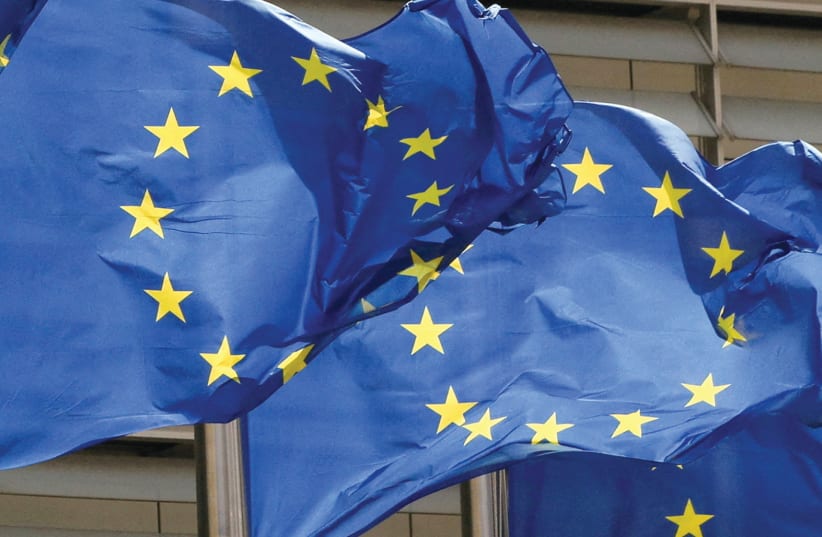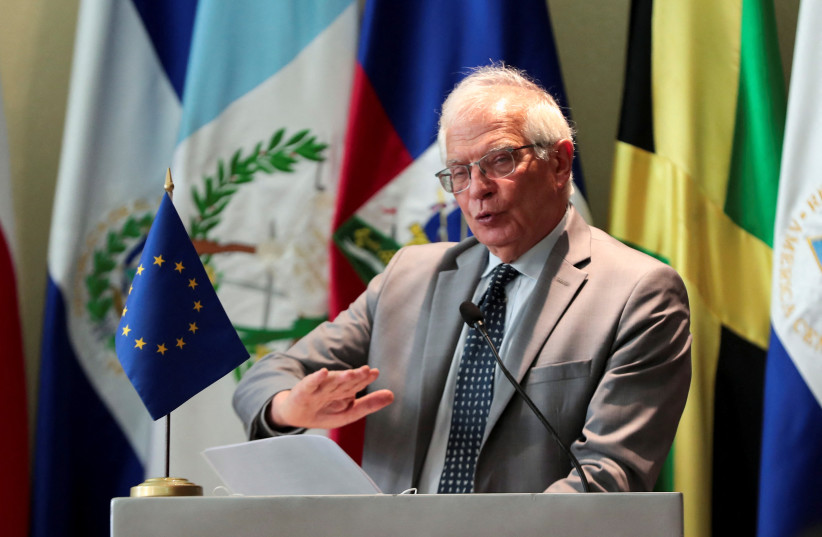Following the European Union’s newly discovered powers, it is urgent for Israel to expose the EU’s double standards on legality and set the record straight about its rights under international law.
The war on Europe’s soil inevitably initiated new diplomatic narratives, new sanctioning methods and also, more importantly, it tested the EU’s capabilities in responding as one unified block.
The unanimity rule has led to a lot of frustrations of top EU leaders that were constantly blocked by just a few member states and even sometimes just by one. Many were seeking to abolish the unanimity rule and replace it by the majority rule in order to facilitate decision making.
That said, the EU’s challenge to respond to geopolitical issues as one unified block has been partly remedied by the current war on the continent. Hungary still remains the EU’s biggest challenge in surmounting the obstacles of a united EU, especially on foreign affairs issues but even on that front, the EU has managed to prove it can be efficient. Orban’s government did come through in the end and recently supported the sixth package of sanctions against Russia. A unanimous EU means a more prominent Europe and a credible player on the world stage.
What does it mean concretely for Israel?
Israel has been on the EU and its member states’ agenda as one of their top priorities when it comes to foreign affairs issues. In just the last two years, the EU’s Foreign Affairs Commissioner High Representative Josep Borrell has issued, via his spokesperson, no less than 11 press releases condemning Israel for supposedly violating international law.
Despite the numerous condemnations and apart from the European Court of Justice’s decision to allow member states to apply differentiation mechanisms on products originating from the West Bank, the EU has limited itself to condemnations only. This meant that no high level meetings were conducted, as both sides were displeased with each other, but it also meant that the EU did not take any action to echo those stances.
The reasons for this are threefold. First, it is, needless to say, that the darkest chapter in European history contributes to the restraint the EU shows towards the Jewish state.
Secondly, the EU realises it is not in its interest to alienate Israel. This stance relies on Israel’s capabilities in terms of science, technology and security, which is widely expressed in the Horizon Europe program that includes cooperation with Israel. The EU fears it will end up isolated in the aforementioned fields, while other countries would be benefiting from the start-up nation. In other words, the EU has FOMO (fear of missing out).
Lastly and fortunately for Israel, the unanimity rule serves as a challenging barrier for the EU to turn its condemnations into actions.
TODAY, THIS may change. EU member states recently discovered their capabilities in a time of emergency and their power to set up a plan of action that can even affect the progress of a war.
This is why it is urgent for Israel to successfully refute accusations and condemnations in order to avoid a wide-scale EU set of actions against Israel, if and when a war breaks out.
If the EU insists Israel violates international law, its top leaders may eventually make use of their newly discovered EU powers.
The way to prevent the EU from sanctioning Israel will depend on our ability to refute the accusations that claim Israel violates international law. The failure to do so up until now stems from Israel’s negligence in defending its legal rights, precisely because Israel deemed it irrelevant, as it was pursuing a two state solution.
In reality, Israel does not violate international law. The EU does not really believe Israel violates international law, not because of the Balfour declaration, not because of the San Remo resolution, but simply because of the EU’s inability to bring up other examples of countries violating the law in question (Fourth Geneva Convention 49(6)), which has been outrageously applied solely to Israel.
International law is not a political tool, it is a system which can implicate all states, not just one state. It is not law if we use one particular law against just one case: Israel. It is neither law and certainly not international if no other cases have been subjected to that questionable interpretation of the law. Essentially, one law against one state is not law but rather a political misuse of the law. The EU should either use the same legal language to condemn all countries that the EU considers occupied or it needs to refrain from an Israel-only legal standard.
According to the EU, “Israeli settlements are illegal under international law.” Meanwhile, the EU never condemned Turkish settlers in Northern Cyprus or Syria, or Armenians moving into Nagorno-Karabakh. Although the EU sanctioned Russia (before the war) over its illegal annexation of Crimea, the Russian population moving into Crimea was never deemed to be illegal. The EU failed to characterise any of these examples as contrary to international law because in fact, people moving into occupied areas are not in violation of international law and the issue is, in fact, irrelevant to any legal question.
The bottom line is, if the EU really believed that voluntarily settling in what it considers as an occupied area is contrary to international law, it would have used the same legal language to condemn all settlers in all occupied territories, starting with the Turkish settlers in Northern Cyprus as this is EU soil. Israel needs to defend its legal rights by exposing the singular legal standard the EU uses to only condemn Israel. It is time to push back and set the record straight before the EU applies its discovered powers against Israel.
Jenny Aharon is the director of Golden Gate Public Affairs, who advises on EU-Israel affairs and works with European Union institutions in Brussels.

